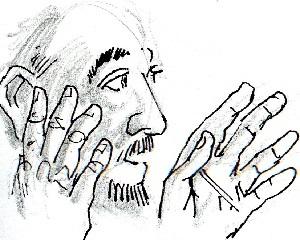
“What do you want me to do for you?” The blind man replied to him, “Master, I want to see” (Mark 10:51).
The story of Bartimaeus is the story of how we all come to faith.
Life on the sidelines keeps us from commitment; we live in the shadows, dependent on the reactions of others to define us. Like blind beggars, we wait for an opportunity to pass by-- our next job, a relationship, some challenge to get us up and moving.
For Bartimaeus, Jesus was his ticket back into the flow of deliberate living, independence and purpose. He made his move, risking ridicule and rejection to find the source of the voice he was hearing beyond the clamor of the crowd, but more especially, in his lonely heart. "Jesus, Son of David, have pity on me."
Because he took the first step, Jesus heard him and called him. The same people who had told him to be quiet now helped him up and opened the way for him to go to Jesus. In his excitement and confidence, Bartimaeus left behind his most valuable possession-- his cloak -- security blanket, his begging spot along the road.
The most important question Jesus will ask each of us is "What do you want me to do for you?" Faith begins with knowing our deepest need. To admit that we are blind, or wounded, or sinful, is the first act that opens us to God's grace. Bartimaeus prays wisely: "Master, I want to see." In those simple words he expresses both his deepest need and his belief that Jesus is Master and has the power to change everything.
Physical sight is a miracle, but spiritual insight opens us to eternity, the wholeness we can only dream about in this life. Jesus calls us beyond our limitations to follow him on the road that leads to life with God, the ultimate answer to all our prayers.
Jesus is passing by today. This is an invitation to pray for what we want and need. God always hears the cry of the poor, the blind, the brokenhearted, the sinner. This is the joy of the Gospel.







